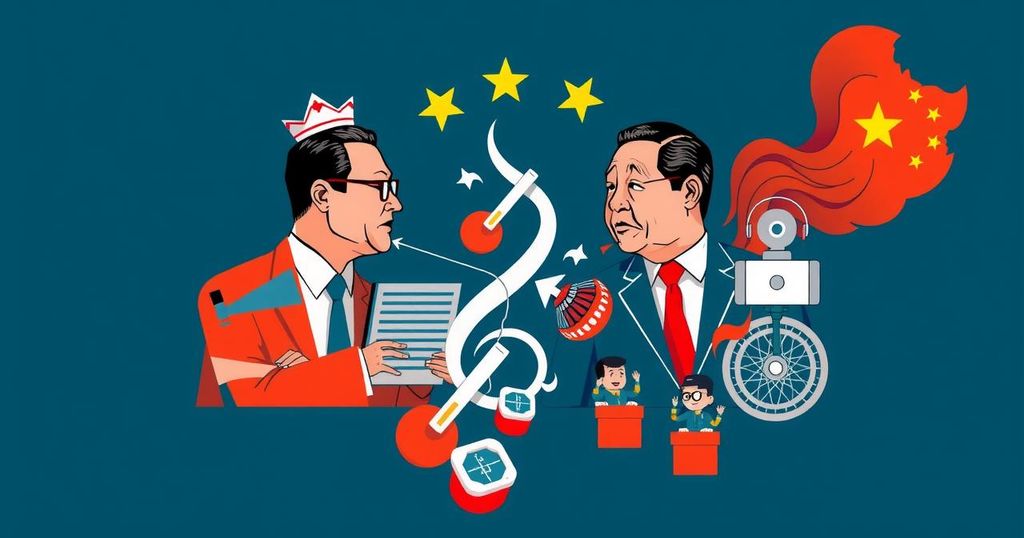World news
AMERICA, ASIA, BEIJING, BEIJING DAILY, CAPITOL HILL, CCTV, CHINA, CNN, DC, ELECTION, FOREIGN POLICY, GLOBAL TIMES, LI SHUO, MEDIA COVERAGE, MEXICO, NATIONAL SECURITY, NORTH AMERICA, NORTHERN MARIANA ISLANDS, OCEANIA, UNITED STATES, US, US-CHINA RELATIONS, WASHINGTON, WASHINGTON, DC, WEIBO, WHITE HOUSE, XI JINPING
Aisha Khan
0 Comments
Chinese State Media Highlights U.S. Divisions Amid Election Results
Chinese state media has focused on U.S. political polarization amid election results, suggesting that regardless of who wins, relations between the U.S. and China will not improve. Reports emphasized a tense environment in the U.S. with fears of violence and unrest, underscoring perceptions of severe divisions within American society, which many in China believe will continue to obstruct positive relations with the U.S.
As the United States anticipates election results, Chinese state media has seized the opportunity to highlight the pronounced political divisions within the country, suggesting a potential for post-election turmoil. China’s state outlets reflect long-standing grievances against U.S. critiques of its authoritarian governance, with President Xi Jinping’s regime increasingly dismissing American democratic ideals. News reported by state sources asserts that the elections reveal severe social discord and political dysfunction. State-controlled media outlets such as the Global Times expressed concern over possible unrest, notifying audiences of heightened security measures in Washington D.C. Although millions voted peacefully, they emphasized intimidating visuals, such as boarded-up shops and security enhancements, while diminishing the overall peaceful participation. According to the Beijing Daily, the elections feel like “theater filled with controversies,” underscoring the entrenched polarization that characterizes the current American political climate. In the wake of the electoral events, discussions on Chinese social platforms highlighted perceptions of the election as merely performative, suggesting indifference regarding the outcomes. A Beijing resident noted that for many Chinese citizens, the eventual winner does not alter their perspective on U.S.-China relations, which are deemed unlikely to improve regardless of the victor. This sentiment resonates across various demographics in China, who anticipate a U.S. administration that will persist in its efforts to constrain China’s global ascent. The dichotomy of U.S. leadership in recent years, oscillating between tariffs and stricter measures under the Trump administration and a focus on stabilizing communication under Biden, reinforces the prevailing belief that U.S. attitudes toward China will not dramatically shift. The overarching consensus remains that American policies aimed at containing China will continue unabated regardless of the electoral outcome, suggesting a determined stance on issues including Taiwan, which Beijing considers a critical point of contention. Ultimately, the ongoing political schism in the United States serves as a focal point for Chinese media, reflecting both the internal divisions of the U.S. and the enduring complexity of the China-U.S. relationship, which many in China perceive to be resolutely adversarial, regardless of the electoral results.
In recent years, U.S.-China relations have become increasingly strained, particularly with issues surrounding trade, technology, and global influence. Beijing often highlights political turmoil within the U.S. as a contrast to its own stable, albeit authoritarian, governance model. The Chinese government’s perspective is that the Western democratic system is fraught with division and dysfunction, which they believe undermines its credibility as a global leader. This narrative is exacerbated by the U.S. policies that are perceived as aimed at containing China, especially under administrations that have enacted tariffs and supported Taiwan.
In conclusion, the portrayal of the U.S. electoral process by Chinese state media serves as both criticism and an opportunity to bolster nationalistic narratives regarding China’s governance. Regardless of the electoral victor, the consensus within China suggests that U.S. policy will remain pathologically antagonistic towards its rising global influence. The significant divisions within the United States are exploited to reinforce the notion that an authoritarian model is preferable when faced with perceived dysfunction in liberal democracies.
Original Source: www.cnn.com




Post Comment